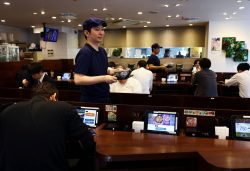17:45 JST, September 21, 2023
Skepticism over the benefits of international trade and multilateral cooperation has been rising, with the economic shocks wrought by COVID-19 and the war in Ukraine fueling perceptions that globalization has exposed countries to excessive risks instead of making them stronger, a world trade report revealed on Sept. 14.
This has led to a change in the geopolitical landscape, with implications for global security, inequality and the accelerating climate crisis, findings of the 2023 edition of the World Trade Report showed.
“Trade is increasingly seen as part of the problem rather than part of the solution to these challenges,” said the World Trade Organization (WTO), which publishes the yearly report. Yet, international trade plays an indispensable role in creating a more secure, inclusive and sustainable world.
WTO is the only global international organization dealing with the rules of trade between nations, with the goal of helping producers of goods and services, exporters and importers conduct their business. It has 164 members, including Singapore.
Singapore, which is highly reliant on trade and plays a role in facilitating global trade flows as a financial hub for the region, is one of the countries most at risk from the changing trends in globalization, World Trade Report coordinator Victor Stolzenburg said.
Trade tensions between the world’s largest trading partners have been on the rise, culminating in the imposition by the United States of an average import duty of 19.3% on imports from China, and the imposition by China of an average import duty of 21.1% on imports from the United States.
Trade restrictions resulting from the war in Ukraine have risen. Out of the 96 export restrictive measures on food, feed and fertilizers introduced since the start of the war in February 2022, 68 were still in place by the end of February 2023, covering roughly $85 billion of trade, the report revealed.
Other unilateral measures taken by large economies include Indonesia’s export restrictions on raw materials, China’s export restrictions on gallium and germanium, which are used to make semiconductors, and a European Union policy roll-out preventing industries from moving to countries with less stringent climate policies to avoid carbon costs.
As a result, trade patterns and relationships are reorienting along geopolitical lines, with nations outsourcing or moving business operations to countries that they have friendly ties with.
While this could reduce production costs and consumer prices, the risk is a concentration of production in certain economies and fewer suppliers for some products, making it difficult to find alternatives and raising the vulnerability of the global economy, WTO said.
Electrical equipment, such as mobile phones and semiconductors, accounts for the highest proportion of the export value of goods with fewer alternative suppliers, followed by fuel.
“When trade starts to fragment like this, there is much less need for hubs as trade will reorientate into blocs of economies that are friendly with each other, and Singapore, which is located closer to the East, may not benefit from a lot of the trade flows that it does right now,” said Stolzenburg.
“If trade starts to flow less from the U.S. to China and more from the U.S. to Europe, for instance, that won’t happen via Singapore. Or if the U.S. starts trading more with Mexico than China, there will be less need for a hub in Asia.”
Stolzenburg added that Singapore could suffer much larger income losses than economies that are less reliant on trade, if international trade starts to fragment.
Still, there have been positive developments in international trade and global supply chains.
Trade was critical in delivering medical goods and vaccines where they were most needed during the pandemic, and grains to food importers since the start of the war in Ukraine, for example.
Advances in sustainability have been made, with trade in goods that promote conservation, reduce pollution and contribute to a greener and more sustainable economy growing much faster than the total volume of goods traded.
Technological developments have made renewable energy a more appealing and viable alternative to producing and transporting goods than fossil fuels, which has helped in the global transition toward a greener economy.
Meanwhile, digitalization has created new jobs, markets and products, and driven a rapid drop in the trade costs of services such as entertainment, financial and administrative tasks that can be delivered digitally across borders.
As a whole, report findings identified the need for more international trade and more cooperation, not less.
“The major issues that policymakers are facing the world over — from security to inclusiveness to climate change — transcend nation states.
“Pandemics, conflicts and greenhouse gas emissions do not stop at borders, and spillovers from domestic choices and policies are much larger than they used to be,” said WTO.
Stolzenburg said: “Singapore has a lot of influence in Asia and can do a lot to convince other economies that a breakdown in international trade is not in anyone’s favor.
“But there is only so much we can do if the large players turn away from the multilateral trade system.”
Top Articles in World
-

Israeli Ambassador to Japan Speaks about Japan’s Role in the Reconstruction of Gaza
-

Videos Plagiarized, Reposted with False Subtitles Claiming ‘Ryukyu Belongs to China’; Anti-China False Information Also Posted in Japan
-

Nepal Bus Crash Kills 19 People, Injures 25 Including One Japanese National
-

Ukrainian Ambassador Closely Watching Japan’s Revision of Defense Export Rules, Hopes for Future Arms Support
-

China, India Tapping into Promising African Market; Beijing Announces Tariff Cuts, Both Countries Aim to Expand Exports
JN ACCESS RANKING
-

Producer Behind Pop Group XG Arrested for Cocaine Possession
-

Japan PM Takaichi’s Cabinet Resigns en Masse
-

Man Infected with Measles Reportedly Dined at Restaurant in Tokyo Station
-

Israeli Ambassador to Japan Speaks about Japan’s Role in the Reconstruction of Gaza
-

Videos Plagiarized, Reposted with False Subtitles Claiming ‘Ryukyu Belongs to China’; Anti-China False Information Also Posted in Japan


























